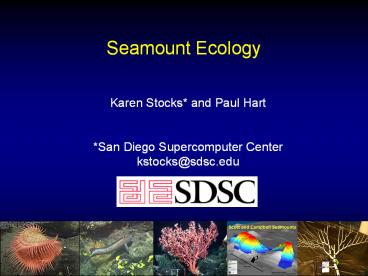Seamount Ecology - PowerPoint PPT Presentation
Title:
Seamount Ecology
Description:
'Attractors' for mobile mammals, tuna, turtles, seabirds. Differences in abundances of zooplankton, nekton. TOPP Program. Long Lived species ... – PowerPoint PPT presentation
Number of Views:148
Avg rating:3.0/5.0
Title: Seamount Ecology
1
Seamount Ecology
Karen Stocks and Paul Hart San Diego
Supercomputer Center kstocks_at_sdsc.edu
2
Why Seamounts are Interesting
3
Benthic Community different species, high
biomass (why?)
? Typical deep seafloor courtesy F. Grassle
Seamount ? (not necessarily typical!) http//ocea
nexplorer.noaa.gov/
4
Pelagic Community
- Attractors for mobile mammals, tuna, turtles,
seabirds - Differences in abundances of zooplankton, nekton
TOPP Program
5
Long Lived species
- This spicule is from a sponge 6 feet tall and 440
years old. ? - - Extremely old corals and crinoids also found.
- - Long-lived, slow growing fishes
Images and age estimates from B. Richer de Forges
and collaborators
6
Unusual BiogeographyParin et al. 1997
7
THE LIVING FOSSILS OF THE NORFOLK RIDGE
SEAMOUNTS courtesy of Richer de Forges et al.
A large number of species from the Norfolk Ridge
Seamounts are ARCHAICS
Brachiopods
Crinoids of the 14 genera of New Caledonia, 8
are living fossils related to mesozoic fauna
Neoancistrocrania norfolki
Gymnocrinus richeri
Gastropods Pleurotomariidae 4 species in New
Caledonia
Caledonicrinus vaubani
Perotrochus boucheti
Perotrochus caledonicus
8
Endemism
- Species found in one restricted location (in this
case a single seamount or seamount chain) and
nowhere else in the ocean
Apparent endemism species that have to date
been found in one restricted location and nowhere
else in the ocean...yet
9
Seamount Endemism
- 1987 global review by Wilson and Kaufmann.
100 seamounts, 1000 species - 12-15 endemic
- Since then, several high reports (gt1000 more spp)
- 35 Tasmanian seamounts (Koslow et al.)
- 31 Lord Howe seamounts (Richer de Forges et
al. 2000) - 36 Norfolk Ridge seamounts (Richer de Forges
et al. 2000) - 44 (fish), 52 (invertebrates) Nazca and
Sala-y-Gomez (Parin et al. 1997)
- But others low
- 12 global fish review (Froese and Sampang
2004) - 9 (fish) from Great Meteor (Fock et al.)
- 5 (fish) from Hawaiian chain (Stocks, in prep)
10
Seamounts as Model Systems
- What conditions promote and maintain endemism?
- Do seamounts act as
- centers of speciation?
- refugia for relict populations?
- stepping-stones for trans-oceanic dispersal?
11
What are the large-scale patterns, and what
drives them?
- What are the gradients in diversity, endemism,
and community composition and what drives them
(productivity, current regimes, isolation) - ? The physical, geological, chemical conditions
are key to understanding the biological
communities
12
Scope for Interdisciplinary research
- 1 We need your data and interpretation to
understand the communities - As formal collaborations
- And as less formal advising
13
Scope for Interdisciplinary research
- 2 Work together to expand sampling
- Interdisciplinary cruises
- Adding a biologist to a geological cruise and
vice-versa - Developing standard minimal sampling protocols
- Sharing samples of broad interest (e.g. bottom
imagery)
14
Biological Sampling to Date
15
Number of Species Observations from Global
Seamounts -gt almost all seamounts are undersampled
Missing
16
Depth Bias
All Seamounts (14,300) from Kitchingman and Lai
2004
17
Latitude Bias
All Seamounts (14,300) from Kitchingman and Lai
2004
18
Active Research
ISI publications on seamount biology/ecology as
of total. From Brewin et al. in review
19
Scope for Interdisciplinary research
- 3 Integrated Data Systems
20
SeamountsOnline seamounts.sdsc.edu
21
(No Transcript)
22
(No Transcript)
23
(No Transcript)
24
Vema
25
New Prototype
26
Thank You
- Note all uncredited images are courtesy of NOAA
Ocean Explorer http//www.oceanexplorer.noaa.gov/































